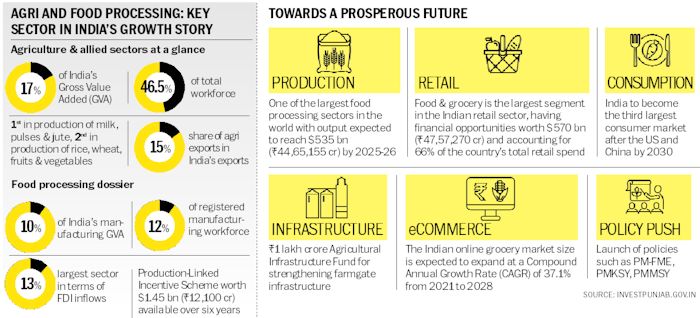Establishing strong supply chains, ensuring fair market practices and promoting value addition through food processing and agro-industries can contribute to the growth and profitability of the agri-business sector.
AGRI-Business refers to the integration of agricultural production and business principles for economic, social, and environmental sustainability through the production, processing and distribution of agricultural products. It encompasses fields such as farming, livestock production, horticulture and food processing. There are several human and institutional links which connect together for successful establishment and operation of any agri-business:
Input providers supply necessary inputs such as seeds, fertilisers, and equipment to growers along with consultation and technical advice on crop or livestock management; capital providers finance agri-businesses through loans to purchase inputs and to support growth and innovation; producers (farmers) produce crop, raise livestock and use resources as well as technologies to enhance productivity and profitability; researchers develop new technologies and solutions to improve agricultural production and food processing. They conduct research on improving crop yields, developing new varieties of crops or improving the safety and quality of food products; storage managers are responsible for logistics, managing the storage and preservation of crops to maintain their quality until they are processed or sold; processors operate food processing plants where they transform raw materials into value-added products and package the agricultural products while ensuring food safety and quality and regulatory standards; the logistics and transportation workforce moves agricultural products from farms to processing facilities, markets and consumers and ensures efficient delivery of products; distributors deliver finished food products to retailers, wholesalers or consumers; marketers develop marketing strategies like advertising and branding to promote and sell food products to consumers through effective marketing campaigns based on consumer preferences and trends; consumers buy food products and drive the development of new goods and innovations.
Establishing strong supply chains, ensuring fair market practices and promoting value addition through food processing and agro-industries can contribute to the growth and profitability of the agri-business sector. Successful operation of agri-businesses requires an approach that integrates sustainable practices, innovative technologies, farmers’ empowerment and market-oriented strategies. By embracing these elements, the sector can thrive, contributing to food security, economic growth and rural development.
Key factors to make agri-business a success: Market analysis, value addition, capacity-building, technology integration, financial support, market linkages, access to inputs, sustainability and conservation, farmers’ empowerment (to facilitate the formation of cooperatives or producer groups to strengthen farmers’ bargaining power, enable collective decision-making and enhance access to resources and markets), monitoring and evaluation of progress and impact by collecting and analysing data to assess the effectiveness of interventions and make necessary adjustments or improvements.
Some important and lucrative agri-business systems are discussed here:
Crop production: These systems focus on cultivating and managing different types of crops, which can include field crops (such as cereals, oilseeds and vegetables), horticultural crops (fruits, flowers and vegetables), or permanent crops (orchards and vineyards).
Livestock production: Livestock-oriented systems involve raising animals for various purposes, such as meat, dairy, eggs, or fibres. Examples include cattle, dairy farming, poultry production, pig farming and sheep/goat husbandry.
Aquaculture: It is the cultivation of aquatic organisms like fish, shellfish, and aquatic plants in controlled environments. It can take the form of fish farming, shrimp cultivation, oyster farming, or seaweed cultivation.
Organic farming: It emphasises the use of natural inputs and techniques while avoiding synthetic chemicals. These systems follow strict guidelines for soil and crop management, pest and disease control and animal welfare.
Agroforestry: Agroforestry combines agricultural practices with the cultivation of trees or shrubs. It aims to create sustainable and productive land-use systems that benefit both crops and trees, providing ecological, economic, and social benefits.
Precision farming: Precision farming relies on advanced technology, such as remote sensing, GPS, and data analytics, to optimise crop and livestock management. It enables farmers to make precise decisions concerning planting, irrigation, fertilisation and harvesting operations.
Vertical farming: It involves the cultivation of crops in vertically stacked layers or controlled environments, such as high-rise buildings or indoor facilities. This system utilises artificial lighting, hydroponics, and climate control to maximise production in limited spaces.
Agri-tourism: Agri-tourism combines agricultural activities with tourism to attract visitors. It includes farm tours, farm stays, farm festivals, agricultural education programmes and on-farm recreational activities.
Agri-processing: It involves the processing, packaging and transformation of agricultural commodities into value-added products. Examples include food processing, beverage production, dairy processing and grain milling.
Agricultural supply chain: These systems encompass the transportation, storage, distribution and marketing of agricultural products from farm to consumer. They involve stakeholders such as farmers, processors, distributors, retailers and consumers.
Establishing strong supply chains, ensuring fair market practices and promoting value addition through food processing and agro-industries can contribute to the overall growth and profitability of the agri-business sector. Successful establishment and operation of agri-businesses require a comprehensive approach that integrates sustainable practices, innovative technologies, farmers’ empowerment and market-oriented strategies. By embracing these elements, the sector can thrive, contributing to food security, economic growth and rural development.
BY : VP Sethi and Ramandeep Singh

